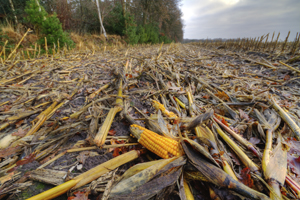Catalytic upgrade

The deoxygenation of biomass such as corn stover or forestry waste could be the key to development of viable biofuels. © Matauw/iStock/Thinkstock
Dwindling crude oil reserves, accompanied by rising prices and environmental concerns, have led to increased interest in the use of renewable fuels. Biofuels produced from waste agricultural or forestry material are particularly desirable because they avoid diverting resources from the production of food crops.
Oils produced by high-temperature treatment of these waste materials, however, contain a large amount of oxygenated compounds that result in undesirable properties such as high viscosity and corrosiveness.
Now, Jie Chang, Armando Borgna and co-workers from the A*STAR Institute of Chemical and Engineering Sciences in Singapore describe a series of catalysts that might be used to upgrade these oils by removing the undesirable oxygen-containing functional groups1. Using the compound guaiacol as a model for oxygenated bio-derived oils, the researchers found that the most promising catalysts for guaiacol deoxygenation are comprised of molybdenum metal on a carbon support.
The diversity of sources of waste biomass means that there is great variability in the content of the bio-oils produced by the initial heat treatment, which is itself the subject of much research. Guaiacol provides, in a single and easily available compound, the types of oxygen-containing functional groups that typically need to be removed.
Catalysts for the related process of desulfurization are widely used in petroleum refineries to produce cleaner fuels, but they are not optimized for deoxygenation. “The desulfurization catalysts are well developed and understood because of extensive research into the mechanisms by which they work,” explains Chang. “We are using guaiacol as a model compound to develop a similar level of understanding for deoxygenation.”
The best catalysts identified by the researchers show complete conversion of guaiacol and over 80 per cent selectivity to the desired hydrocarbon products within minutes.
Chang and co-workers undertook a detailed study of the structure of the catalysts before and during the reaction, as well as of the catalysts that were deactivated. They also attempted to identify the reaction process — in particular, the types of oxygen-containing functional groups that react first and whether this affects the performance of the catalyst.
While catalyst selectivity is critical, other factors such as the activity and stability of the catalyst will prove equally important because of their impact on the economics of the overall process. “There is a long way to go before this complete ‘biomass to fuel’ process can become commercial,” says Chang. “Also, we hope to develop the selectivity even further so that it becomes useful for developing fine chemicals as well as fuels.”
The A*STAR-affiliated researchers contributing to this research are from the Institute of Chemical and Engineering Sciences
Associated links
Journal information
Chang, J., Danuthai, T., Dewiyanti, S., Wang, C. & Borgna, A. Hydrodeoxygenation of guaiacol over carbon-supported metal catalysts. ChemCatChem 5, 3041–3049 (2013)
Media Contact
All latest news from the category: Life Sciences and Chemistry
Articles and reports from the Life Sciences and chemistry area deal with applied and basic research into modern biology, chemistry and human medicine.
Valuable information can be found on a range of life sciences fields including bacteriology, biochemistry, bionics, bioinformatics, biophysics, biotechnology, genetics, geobotany, human biology, marine biology, microbiology, molecular biology, cellular biology, zoology, bioinorganic chemistry, microchemistry and environmental chemistry.
Newest articles

Security vulnerability in browser interface
… allows computer access via graphics card. Researchers at Graz University of Technology were successful with three different side-channel attacks on graphics cards via the WebGPU browser interface. The attacks…

A closer look at mechanochemistry
Ferdi Schüth and his team at the Max Planck Institut für Kohlenforschung in Mülheim/Germany have been studying the phenomena of mechanochemistry for several years. But what actually happens at the…

Severe Vulnerabilities Discovered in Software to Protect Internet Routing
A research team from the National Research Center for Applied Cybersecurity ATHENE led by Prof. Dr. Haya Schulmann has uncovered 18 vulnerabilities in crucial software components of Resource Public Key…





















